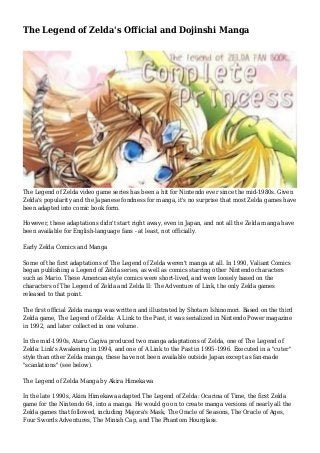
The Legend of Zelda's Official and Dojinshi Manga
- 1. The Legend of Zelda's Official and Dojinshi Manga The Legend of Zelda video game series has been a hit for Nintendo ever since the mid-1980s. Given Zelda's popularity and the Japanese fondness for manga, it's no surprise that most Zelda games have been adapted into comic book form. However, these adaptations didn't start right away, even in Japan, and not all the Zelda manga have been available for English-language fans - at least, not officially. Early Zelda Comics and Manga Some of the first adaptations of The Legend of Zelda weren't manga at all. In 1990, Valiant Comics began publishing a Legend of Zelda series, as well as comics starring other Nintendo characters such as Mario. These American-style comics were short-lived, and were loosely based on the characters of The Legend of Zelda and Zelda II: The Adventure of Link, the only Zelda games released to that point. The first official Zelda manga was written and illustrated by Shotaro Ishinomori. Based on the third Zelda game, The Legend of Zelda: A Link to the Past, it was serialized in Nintendo Power magazine in 1992, and later collected in one volume. In the mid-1990s, Ataru Cagiva produced two manga adaptations of Zelda, one of The Legend of Zelda: Link's Awakening in 1994, and one of A Link to the Past in 1995-1996. Executed in a "cuter" style than other Zelda manga, these have not been available outside Japan except as fan-made "scanlations" (see below). The Legend of Zelda Manga by Akira Himekawa In the late 1990s, Akira Himekawa adapted The Legend of Zelda: Ocarina of Time, the first Zelda game for the Nintendo 64, into a manga. He would go on to create manga versions of nearly all the Zelda games that followed, including Majora's Mask, The Oracle of Seasons, The Oracle of Ages, Four Swords Adventures, The Minish Cap, and The Phantom Hourglass.
- 2. Himekawa also did a 2005 version of A Link to the Past (which had been re-released on the Game Boy Advance), making that game the most-adapted Zelda title. In 2008, San Francisco-based manga publisher Viz Media began reissuing English-language versions of the Akira Himekawa Zelda manga in ten volumes. The Viz editions appeared in the order of their original publication, with the most recent release being The Phantom Hourglass in October 2010. Bootleg and Dojinshi Legend of Zelda Manga The sporadic availability of Zelda manga outside of Japan has stoked a demand for bootlegs and unofficial versions. The Ataru Cagiva and Akira Himekawa Zelda manga have long been circulated as "scanlations," digital copies scanned and translated by anglophone collectors fluent in Japanese. Also, The Legend of Zelda has been the subject of amateur, unofficial manga called dojinshi or doujinshi. A dojinshiversion ofThe Legend of Zelda: Twilight Princess has recently surfaced in an English scanlation. Zelda manga exploded in Japan beginning in the mid-1990s, and now nearly every Zelda game gets adapted. But while more Zelda manga have have been reissued in translation in recent years, English-reading fans may still have to make do with scanlations to complete their collections. You might also like... The Legend of Zelda: The Wind Waker Revisited When The Legend of Zelda: The Wind Waker was released for the Nintendo GameCube in 2003, the Zeld...